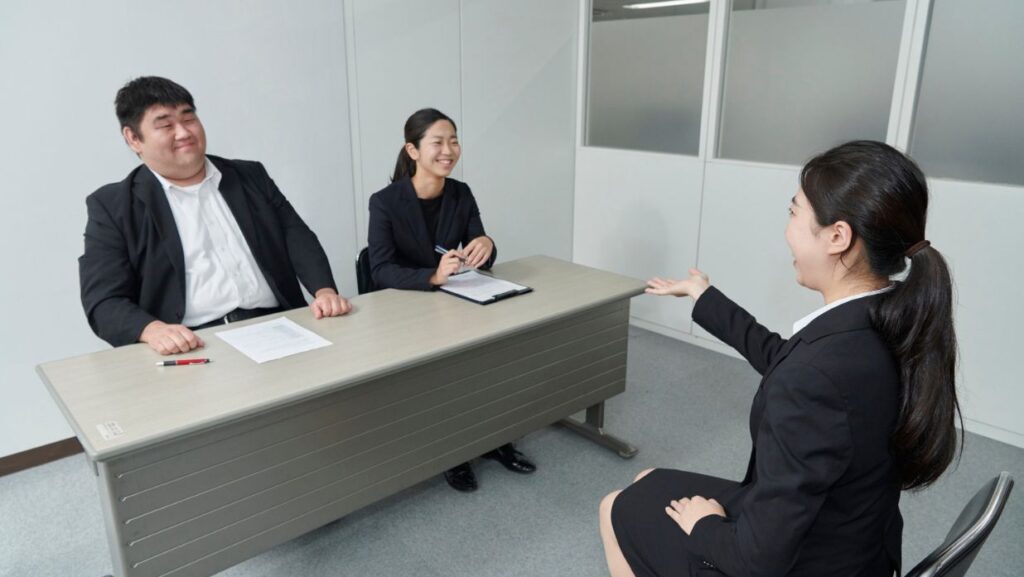Now that you have landed a job interview in Japan, you must be wondering what manners you need to know. Understandably, you might be nervous since interviews are when you need to put your best foot forward. So, how should you present yourself in front of your potential employers?
As you may know, Japan places a high value on manners, humility, and understanding of social cues. Just like showcasing your abilities, your impressions of your employers are just as essential. In order to ensure you’re prepared, we have broken down everything you need to know about job interview manners and etiquette in Japan.
Want to boost your career in Japan? Coto Academy’s 3-month Business Japanese Course is designed to help you master keigo (business Japanese) and improve workplace communication skills. Gain the confidence to speak with clients, navigate meetings, and open up new career opportunities!
How are Japanese job interviews different from other countries?

A Japanese job interview is more formal and structured than in many other countries, emphasizing etiquette, group harmony, long-term commitment, and humility over individual assertiveness or achievements.
Throughout this article, you will probably pick up on many similarities and differences between Japanese interviews and those in your home country. Like everywhere else, in an interview, you want to present the best of who you are and what you can bring. So, that means being respectful, listening well, and giving your interviewers a great impression.
However, in Japan, the etiquette for job interviews might reflect how Japan’s work culture is different from the West overall. Unlike in countries like the U.S., Japanese interviews have strict etiquette rules, such as knocking exactly three times and using specific phrases when entering, sitting, and leaving. So, to give the best impression, understanding proper etiquette will be essential, such as when to bow, what to say at what time, and even how to enter interview rooms.
What to prepare before your Japanese job interview
Japanese job etiquette starts with preparation, from how to dress and what to bring. Even if the job doesn’t require any Japanese, if you’re interviewing with a Japanese company, you may still need to know Japanese interview manners.
Dressing for your interview in Japan
The dress code for interviews in Japan will depend on the role type, company, and seniority. Sometimes interviewers will explicitly say you can dress casually for the interview. Also tech start-ups tend to boast more causal atmospheres, so a suit won’t hurt but you might be overdressed!
When a dress code is not specified or if you are unsure, as a general rule of thumb, you should always dress formally. That generally means a full suit and dress shirt or blouse. Colors should be muted and not too loud as the formal dress code in Japan should be uniform and not stand out. Below, we go into further detail about the dress code between men and women:
For men, the general dress code is a full suit with darker colors and a dress shirt.
- Suit jacket and pants with black, blue, or darker colors to be safe. Japanese culture, especially in work, should be about how you fit into the workplace. So wearing colors to stand out is not ideal.
- A nice tie that is also preferably dark and matches your suit. Your tie should also not stand out either, so you may want to opt out of ties with bright colors.
- White or light-colored button-up shirt, shirt should be rather neutral and contrast with the darker colors of your jacket.
- Black or brown shoes, and leather shoes are the most common but non-leather formal shoes are also acceptable.
For women, a full suit with either pants or a nice skirt is considered acceptable
- Suit Jacket with black, blue, or darker colors. As mentioned earlier, Japanese culture is more about fitting in, especially in a formal setting. So, avoid wearing colors that stand out.
- Light-colored blouse or button-up shirt that won’t contrast with your jacket and pants or skirt.
- Darker-colored skirts or pants. The color should be the same as your jacket.
- Darker colored heels under 5 cm, you don’t want to wear heels that are too high since they generally stand out.
- Simple and natural make-up is considered professional in Japan.
What to bring to your Japanese job interview
Oftentimes, you don’t need to bring anything since you probably already sent over documents through email communication. However, just to be safe, keep the following things:
- Japanese resume or rirekisho since they could ask you to provide your own copy that is up-to-date and keep it for internal records. You probably won’t need to bring your cover letter if you wrote one.
- Residence Card, Passport, or some kind of ID, since they may want to check your visa status and also have your official identification for internal processes. If the role needs you to drive, you should also bring your driver’s license to show you are qualified to drive in Japan.
- Note pad in case you need to take notes or jot down information, which could include important dates, details about the role or company, and anything else you might want to reference.
- Pen for filling out any documents, paperwork, tests, or taking notes.
- A professional bag or something to keep documents, business cards, and other things you receive from the interviewer.
- A hanko/inkan (signature stamp) if you have one, since Japanese companies may need you to stamp documents. Usually, this will only be necessary for the actual offer contract.
Etiquette for arriving at a Japanese job interview

Etiquette in Japanese interviews is not just about what you do during the interview but also about punctuality and being prepared.
When to arrive at the office
Punctuality is a part of Japanese interview etiquette, so you should try to arrive around 10 to 15 minutes before your interview. If your train or bus is delayed (we know it happens), just let your interviewers, or person of contact, know with a quick message. To be safe you can grab a Densha Chien Shoumeisho (電車遅延証明書), which is a little piece of paper providing evidence that your line was delayed.
A little tip about online interviews in Japan: You should try to be in the online meeting room around 5 minutes before it starts. Punctuality is also taken seriously for online interviews, so it is best to be a little early since being a little late
Arriving at the interview location
When you arrive at the office, there might be a phone or a receptionist whom you can inform of your name and time of the scheduled interview. You will probably wait briefly in the lobby before being led to a meeting room.
When entering the interview room, there is a sequence of steps you take to show proper manners:
- Knock 3 times and wait for a response
- When entering, say 失礼します(shitsureishimasu) and close the door gently
- Greet them with a bow and a brief self-introduction はじめまして、__ともうします(hajimemashite __to moushimasu) which means something like, “nice to meet you, my name is __”
- You will be offered a seat, but before sitting again, say “shitsurei shimasu”
- Take off your jacket, and if you have a bag, place it somewhere next to you (like another chair), but do not place it on a table.
Quick Tip: Make sure your phone is on silent mode or turned off! You don’t want the interview to be interrupted by an alarm, an incoming phone call, or anything else your phone might do. It could also come off as rude.
Common Japanese job interview manners
So, now we will go over common etiquette to follow throughout the interview, including posture, language, and brief self-introductions.
Using keigo
Generally, you should speak in keigo especially if the role you’re applying for requires business-level Japanese. In many cases, teineigo or the desu and masu form is sufficient. However, try to avoid very casual language or overly direct language.
Like in interviews in other countries, keep general interview etiquette in mind, sound excited to join, and ask questions about the company. Avoid going straight to discussions about salary as this will not give off the best impression. Check out some useful phrases used in Japanese job interviews.
If you want to improve and practice business Japanese, please check out Coto Academy’s Business Japanese Courses.
Body language and posture
You may be nervous during your interview, and that’s okay! Try to relax and be yourself and focus on being sincere and answering each interview question honestly. Don’t overthink. Sit straight and look confident. Here are just a few tips to give off the best impression possible:
1. Avoid crossing your arms and legs
This could give off a somewhat disrespectful impression.
2. Avoid slouching
This also doesn’t give the best impression. It can make you look like you are not too serious about the company and may even affect your confidence, or at least how it’s portrayed.
3. Maintain eye contact
You want to give the interviewer your undivided attention and show you are valuing their time.
4. Keep your hands on your lap or above the table if there is one
You want to avoid putting your hands in your pockets or ending up crossing your arms. There are no specific rules but you don’t want to fall into habits that could unintentionally diminish the impression you want to give.
5. Be sincere and answer honestly
This is probably the most important aspect of the impression you will have on your interviewers. They just want to know if your background and personality will be a good fit for the company. So, let your sincerity take the lead here.
6. Don’t be afraid to ask for further clarification
There may be times when they speak rather fast or go through something that you didn’t quite catch. People might hesitate to ask to clarify or have the interviewer repeat themselves but don’t worry it’s not rude and it shows your sincere interest in understanding the company better.
7. Be natural!
This may sound obvious but often we find ourselves overthinking and trying to do everything perfectly. All you’re trying to do is show how you are as a person to work with. So, just be yourself and show that you are sincerely interested in the company.
Introducing yourself during the job interview

You may have introduced yourself earlier in the job interview, but when they ask you to introduce yourself after everyone has settled in, the interview questioning has begun. So, you will need to provide a longer self-introduction that generally includes the following:
- Your name and age.
- When you came to Japan and how long you have been here.
- Your current university or when you graduated from university. You should also include your major and what you studied. If you already have work experience, you should focus more on the roles you have done.
- Your most recent work or internship experience.
- A brief description discussing why you applied for the company.
- Briefly mention hobbies or something about yourself
For more details about making an amazing self-introduction, read our introduction to jikoshoukai blog!
How to wrap up your job interview in Japan
Even if you’re at the end of your interview, you should not throw all etiquette out the window! Japanese interviews do not end until you walk out the door. So, once the interviewer announces that everything has concluded, you can remain seated and bow, saying ありがとうございます (arigatou gozaimasu).
Afterward, you will generally follow these customs:
- They will give you a business card which you must take with both hands and then place neatly in your bag. Exchanging business cards is a serious ordeal in Japan. You can read more about how to exchange meishi here.
- When you are ready to leave, you can stand up and bow, then you head to the door turn around and bow again saying 失礼します (shitsureishimasu)
- Close the door quietly after leaving.
- It is not uncommon for interviewers or receptionists to walk you to the door or elevator, and right before you depart, you can say thank you again, followed by 「失礼します」while bowing.
What questions are they going to ask in Japanese interviews? Find out about key questions you are likely going to be asked in Japanese interviews!
Conclusion: Japanese Interview Etiquette is about Good Impressions
It’s normal to be nervous about doing Japanese job interviews, especially in a foreign country like Japan. Focus on being yourself and highlighting the best parts of you!
We hope you can use this guide to be aware of common Japanese etiquette to enhance your impression of your potential employers. We know job hunting is already difficult even without the extra rules of interview manners, but as you keep practicing, it’ll become second nature to you!
If you want to practice business Japanese, sign up for Coto’s Business Japanese classes where you do mock interviews and practice speaking Japanese for work!
FAQ
When should I arrive at a Japanese Job interview?
It is proper etiquette to arrive sometime between 5 and 15 minutes before the interview begins. You do not want to be too early or too late.
What should I wear for Japanese interviews?
The common etiquette is a dark suit and tie for men and for women a blouse, jacket, and dress skirt or pants.
How long are Japanese interviews usually?
Interviews usually range from 30 minutes to 1 hour. They can go on for longer depending on how much time the interviewers have and how quickly you go through the questions.
What is considered rude in a Japanese interview?
Quite a few things could be considered rude, such as arriving late, wearing inappropriate clothes, putting your feet on the furniture, and using casual language. Just keep general manners in mind, dress for the occasion, and show respect for your interviewers, such as using polite language.
How can I best impress my interviewers?
Understanding and displaying proper Japanese etiquette will give a great impression to the interviewers. But just as importantly, you should show your sincerity and passion for the role and company.
What is interview in Japanese?
“Interview” in Japanese is 面接 (mensetsu), commonly used for job or school interview.
